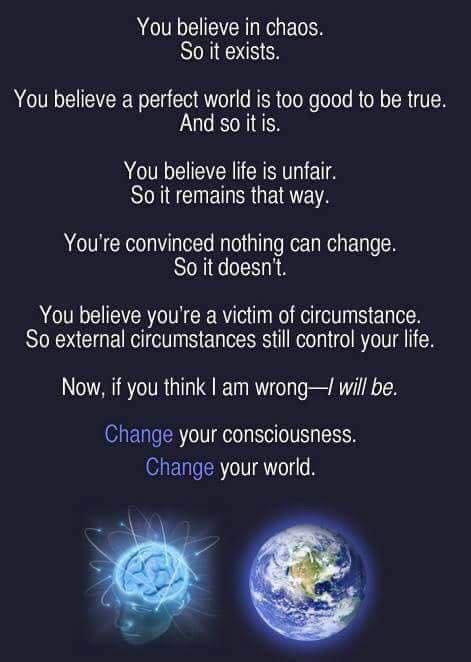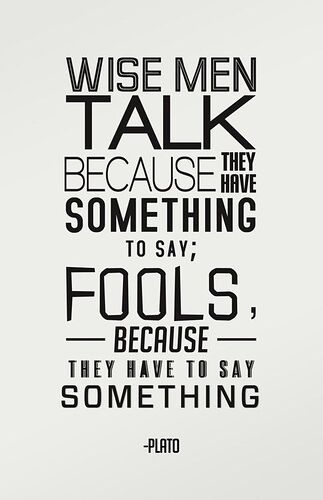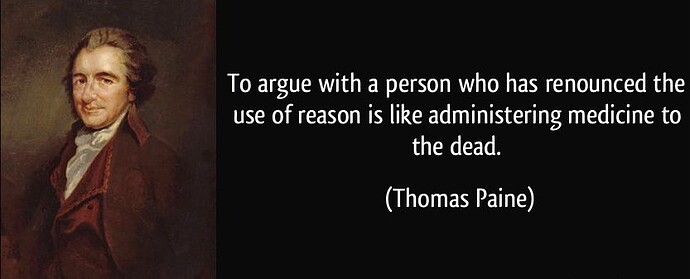Nature didn’t compel me to flip-flop as if it forced this on me, no. I thought that you wouldn’t post anymore but when you did it gave me greater satisfaction to answer you.I don’t like to intentionally ignore people. I may still still bow out if your posts are repetitive and I don’t think there’s any progress being made.
What was unfolding inside my head was before I said I was going to bow out was basically frustration with the lack of progress. Haven’t you ever said you were never going to do something again, and then you did it again? I don’t have identifiable reasons why I decided to post after I posted that I was bowing out. Maybe I felt more relaxed and at that moment I changed my mind when you were the only one posting. Maybe I saw something in your post that I wanted to respond to. We can change our mind up to the very last instant before we make a choice.
A libertarian would think I had a choice, where I know I didn’t. It’s not about the inflection, it’s about the underlying belief system.
Nature hasn’t compelled me to choose something; nature has compelled me to desire to choose something.
We can’t “choose” words that are not part of our repertoire. If every move we make is not done of our own free will, and every thought is not done of our own free will, we have no choice in anything we do. Contemplation is also part of the causal chain, which moves us in only one direction.
You can put it that way.
That’s perfectly fine to say, although “your responsibility perceived by others” is a judgment that will not occur under the changed conditions.
No, you are misunderstanding. Before you do something that requires serious thought, you contemplate, right? There is no mysterious “I” that comes to a decision. All I am saying is that this law prevents the act of crime BEFORE it takes place, not AFTER. Why? After contemplating should I rob this person or not, for example, the desire to rob will be less satisfying than not to. If this person chooses not to rob, do we need to do those things that were required in a free will society such as incarcerate, rehabilitate, punish, seek justice and recompense?
to be cont…
So, in terms of an actual context preciptating actual choices precipitating actual behaviors, show me where/how the author has demonstrated empirically that someone wanting to do something is not in turn just a necessary adjunct of his or her brain complying with the laws of matter.
Instead…
And here is your exceedingly thin response:
This is really all you have to fall back on, isn’t it? You simply keep repeating the mantra that the author doesn’t need to close that staggering gap between what he thinks he knows about free will among the human species here on planet Earth and how the existence of Earth itself somehow fits into staggering enormity of the task involved in grappling with an understanding of our own existence in what may be a multiverse encompassing an infinite number of universes.
You don’t go there in my opinion because that puts a gigantic crack in the edifice that has become the discovery that has become the very foundation onto which you anchor all that is purposeful and meaningful in your life.
Just as for years, I too resisted abandoning first God, then Marxism, then the “authenticity” embraced by existentialists as my very own foundations.
Trust me: I do know what is at stake here for objectivists of all stripes.
Then, the part that truly baffles me:
Yet despite this, you cling to an “agency” which you claim to possess even though this agency “for all practical purposes” changes nothing regarding the things you think, feel, say and do!
Others here might perhaps try to make better sense of this for me. Because your rendition simply makes no rational sense to me given my own understanding of determinism.
No, you can’t literally go backward, but you can imagine determinism in a particular way and go back and speculate as to how your own understanding of it would for all practical purposes impact on the choices you made before, during and after they are made. For me, “no free will”, no autonomous “agency” exist from start to finish. For you however there seems to be some manifestation of actual agency that reconfigures into no free will only after the choice is made. But nothing is “prevented” unless it is in sync with nature unfolding inexorably [per its laws] as it must.
That’s the part that I am not yet compelled to latch onto.
Thus:
Over and over and over and over again: precisely the sort of observations and suggestions I would expect from someone who believed that their preferences and the direction that their sense of satisfaction goes in, was embodied in an agency embodied in at least some measure of free will.
Only they are convinced that they are choosing these things of their own volition, not “choosing” them only because nature wholly compels them to.
Always you want it both ways. You topple over only as nature compels you to, but unlike the domino it is absolutely vital for you to believe that you participate in “choosing” to. Nothing at all changes in terms of what you must think, feel, say and do…but at least nature has evolved for you into an “I” that does “choose”.
It doesn’t work that way for me. Instead, it is only profoundly mysterious. How can mindless matter evolve over billions of years into a lifeform possessing a brain possessing a mind culminating in a self-conscious “I” wholly in sync with the laws of matter and be able to actually grasp that!!
The hard guys are, of course, groping and grappling to understand that experientially, experimentally, scientifically, empirically, materially, phenomonologically, etc… Their discoveries are not predicated solely on intellectually self-serving assumptions and defintions.
The only question is whether this in and of itself is but another manifestation of wholly natural compulsions.
It doesn’t matter that there are “many factors that affect choice, which we consider every time we deliberate” if all of them are wholly in sync with the only possible reality that can unfold in a nature that includes the matter we call mind.
Consider:
The Boeing 737 is made up of 367,000 parts. And not a one of them chooses a damn thing.
The average human brain has about 100 billion neurons. And each of them works in sync with all of the others to embody an “I”. But how [in tandem] do they encompass an “I” that either does or does not possess the will to choose freely among options?
No doubt about it, the parts of an airplane were thought up and assembled by the parts of our own brains. But the distinction between not choosing, choosing and “choosing” here is far, far, far, far from being wholly understood, settled.
Except for objectivists of your ilk. However you are compelled to understand the profound mystery embedded in the fact of existence itself, you are compelled in turn to insist that others had better damn well better concur with it. Otherwise…
They!
Are!!
Wrong!!!
Right?
I’m merely compelled to suggest that this frame of mind is more in sync with the manner in which I am compelled in turn to keep coming back to this part: ilovephilosophy.com/viewtopi … 5&t=185296
[/quote]


